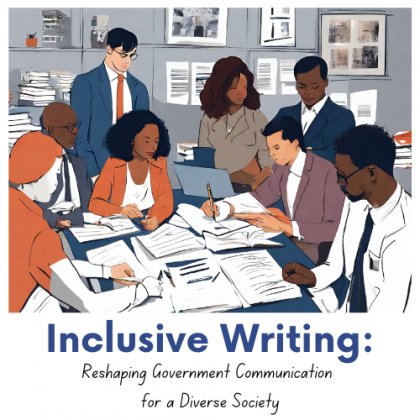Written by Jun Kit Man, Digital Media Manager
In today's world, where diversity in culture, language, and thought is the norm rather than the exception, the need for inclusive writing in government communication has become more pressing than ever. This need is particularly acute within the UK civil service.
Understanding Inclusive Writing
Inclusive writing is not merely a trend; it is a respectful acknowledgment of diverse audiences. As Civil Service College Trainer Rebecca Rothwell aptly puts it, “Inclusive writing does not have an inherent bias or pander to stereotypes." It is about crafting messages that resonate across the spectrum of society, eliminating language that might inadvertently exclude or offend.
Government departments communicate with an exceptionally diverse audience. Inclusive writing ensures that these messages are universally understood and respectful. "The traditional writing style of so many British companies lends itself far more to white, male style and vocabulary, which just does not reflect UK society," Rothwell observes, highlighting the need for a shift in public sector writing.
A significant challenge in inclusive writing lies in overcoming ingrained biases and stereotypes. Rothwell points out, "We all have biases that show through in our writing." Common missteps include gender biases, cultural insensitivity, and ableist language, which can alienate sections of the audience.
A recent example of how inclusive writing can address these biases is evident in the UK Home Office's 2022 "Migrant Integration Strategy." The strategy's language was carefully crafted to be inclusive of LGBTQ+ migrants, avoiding gendered language and recognising diverse family structures. This approach reflected the UK's commitment to inclusivity and helped create a more welcoming environment for all migrants.
Diverse Demographic Challenges in UK Civil Service
The UK civil service face a unique set of challenges in their pursuit of inclusive writing. One primary challenge is the diverse demographic landscape of the UK. Writing messages that resonate across various cultural, linguistic, and socio-economic backgrounds is a complex task that demands a deep understanding of the audience and an adaptable communication style.
Another challenge lies in avoiding jargon and complex language that can alienate or confuse the reader. Government documents and communications often fall into the trap of using excessively technical or bureaucratic language, which can be inaccessible to a significant portion of the population.
Moreover, unconscious biases and a historical tendency towards a more homogeneous style of communication add layers of complexity. These biases can inadvertently lead to the exclusion of certain groups, thereby defeating the purpose of reaching a broader audience.
Rebecca Rothwell's Journey and Expertise in Inclusive Writing
Civil Service College trainer Rebecca Rothwell has played a significant role in promoting inclusive writing within the UK civil service. With over 15 years of teaching experience, Rothwell has developed a comprehensive course on inclusive writing, emphasising the importance of understanding the impact of language and fostering a mindset that prioritises inclusive communication. Her ventures into ghost writing, authoring, and blogging reflect her love of language. “I love language and linguistics, and I'm fascinated by word choices and how our personal experience affects the way that we speak, the way that we write, and the words that we choose to use.”
Rothwell's course is designed to address the nuances of inclusive writing. She emphasises "Effective communication in the public sector is about ensuring every voice is heard and respected. It's about making every person feel included in the conversation, not just a select few”. This approach is foundational to creating government communications that are not only informative but also inclusive and engaging.
Continuous learning and training in inclusive writing are indispensable. Rothwell, with her extensive teaching background, emphasises the importance of understanding the impact of language. "Training sessions need to bring unconscious bias into the conscious mind," she says, highlighting the role of education in fostering inclusive writing.
Advocating Simplicity and Clarity in Writing
Rothwell also tackles misconceptions head-on, advocating for simplicity and clarity. "The best way to write is using everyday language that's familiar and easy to read," she advises. This approach is crucial in demystifying government communication and making it accessible to a wider audience.
A practical example of inclusive writing making a difference can be seen in a recent government campaign that successfully engaged diverse communities by using language that was respectful and relatable. Rothwell notes, "Effective, worthwhile, and meaningful training sessions create content that resonates with everyone."
The benefits of inclusive writing are evident in various government initiatives. For instance, the Department for Work and Pensions (DWP) has implemented inclusive language guidelines to ensure that its communications are accessible and respectful to people with disabilities. These guidelines have helped the DWP create more user-friendly documents and websites that better serve the needs of disabled citizens.
Inclusive Writing: A Public Sector Responsibility
In a society as diverse as the UK, inclusive writing is not just a matter of practicality; it is a moral imperative. As Rothwell aptly puts it, "It's vitally important that when anyone in the UK reads a document, especially a government document, that it reflects the reader more than it reflects the organisation or the writer." By embracing inclusive writing, government departments can demonstrate their commitment to fostering a society that is inclusive, respectful, and welcoming to all.
Through her course, Rothwell is not just teaching a skill; she is fostering a mindset. A mindset that recognises the power of words and the responsibility that comes with it, the responsibility to communicate in a way that is inclusive, respectful, and reflective of the society we live in.
Interested in honing your writing skills? Rebecca Rothwell offers specialised courses in inclusive writing and precise writing. These courses are ideal for civil servants seeking to communicate effectively with diverse audiences and to express their ideas clearly and concisely. Through these courses, you'll learn to avoid biases and stereotypes, ensuring your writing is respectful and engaging for all.

